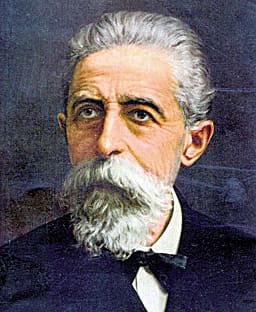On this Labor Day, we celebrate a Vincentian who advised Pope Leo XIII when he wrote the 1891 landmark Encyclical that has shaped Catholic social teaching for over a century. We also celebrate Frederic Ozanam who decades earlier raised his voice on these issues.
 Blessed Giuseppe Toniolo’s beatification put an exclamation point on the legacy of Catholic social teaching, which is sometimes wistfully called the church’s “best-kept secret.” What is even less well known than the Church’s social teaching is its roots in Blessed Frederic Ozanam.
Blessed Giuseppe Toniolo’s beatification put an exclamation point on the legacy of Catholic social teaching, which is sometimes wistfully called the church’s “best-kept secret.” What is even less well known than the Church’s social teaching is its roots in Blessed Frederic Ozanam.
The John Allen of the NCR writes “Giuseppe Toniolo is now the first economist ever beatified by the Catholic church.” Little known is that he was an active member and advisor of the Society of St. Vincent de Paul. He is another one of the figures who was influenced by the social thought of Frederick Ozanam.
He helped lay the intellectual groundwork for Pope Leo XIII’s landmark 1893 encyclical Rerum Novarum, and was among the most energetic propagators of a distinctively Catholic approach to the new social questions raised by the industrial age. Toniolo was an early Catholic advocate of labor unions (he favored the so-called “white unions,” as opposed to the “red” unions linked to Marxism), the fight against child labor and exploitation of workers, mandatory days off work, just wages and access to credit, and a number of other social reforms. He was part of a budding European network of Catholic social thinkers in the late 19th century pushing similar ideas.
These were positions earlier advocated by Frederic Ozanam. See David Gregory. John Paul II alluded to this in his homily at the beatification of Frederic in 1997.
Pope Paul VI and Pope John Paul II both held him in high esteem. Further references….
- Layman who made being an Italian Catholic Politician acceptable
- A Vincentian Ahead of his Times
- John Paul II Homily at beatification of Ozanam
“So it is that we can see in him a precursor of the social doctrine of the Church which Pope Leo XXIII would develop some years later in the Encyclical Rerum Novarum.” Homily by John Paul II at beatification of Frederic Catholic social thought would later come to be called “subsidiarity,” meaning not substituting centralized authority for what can better be handled at lower levels, or privately.







In my book SEEKING JUSTICE IN THE WORLD; SUMMARIES OF PAPAL JUSTICE ENCYCICALS : Paperback – 16 Dec 2016 by James Patrick Hynes (Author) obtainable from Amazon I WROTE….
FREDERICK OZANAM AND SOCIAL JUSTICE
“I reminded members of the St Vincent de Paul Society that in 1848 our principal founder, Frederick Ozanam advised his friend Foisset thus: “I ask you: let us occupy ourselves with people who have too many needs and not enough rights, who call out rightly for a greater involvement in public affairs, for guarantees of work-and who cry out against misery.”
Seeking Justice in the World: Summaries of Papal Justice Encyclicals Paperback – 16 Dec 2016 by James Patrick Hynes (Author) obtainable from Amazon
In his encyclical ‘Deus Caritas Est’ (God Is Love) published in 2005, Pope Benedict XVI wrote: “As Augustine once said, a State which is not governed according to justice would be just a bunch of thieves.”
Some fifteen hundred years after St. Augustine, in 1891, Pope Leo XIII published the first of a succession of social justice encyclicals and they became known as the ‘Church’s Best Kept Secret’ because they were never widely acknowledged, read or acted upon within the universal Church.
These documents were radical, secretive and neglected. Few clerics knew or cared much about them. Nevertheless their impact within the secular world was stronger from time to time. For example, after the publication of the encyclical Mater et Magistra (Christianity and Social Progress) by Pope John XXIII, 1961 opponents among the politically aware rejected it by crying out, “Mater, si! Magistra, no.” (Mother, yes! Teacher, no!). Further evidence of the radical strength of the encyclicals followed the promulgation of Pope Paul VI’s ‘Populorum Progressio’ in 1967. According to Dr. Rupert J. Ederer, an eminent American writing ‘America and Catholic Social Teaching: An Urgent Warning’ stated: “It is not surprising that a leading herald of neoliberalism, The Wall Street Journal, referred to the contents of Populorum Progressio, when it appeared, as ‘warmed over Marxism.’ ”
The Church’s social doctrine is not a ‘third way’ between liberal capitalism and Marxist collectivism. It is in a category of its own, not an ideology but an accurate formulation of reflection on the complex realities of human existence as they conform to the Gospel in moral theology.
As such they consistently put the person first ahead of socio economic and political systems. “Work, in the first place, is for the worker not the worker for work”, ‘Laborem Exercens’ (On Human Work). These summaries of the original robust encyclicals, consistently and frequently controversially, place human beings, never capital and property, at the centre of things.
They support: trades unions; the right to strike; the rights of workers to manage and share profits; the state protection of citizens; responsible private ownership; equitable distribution of wealth; rights for refugees. They condemn the excesses of both capitalism and socialism but approve aspects of each in moderation. Unrestricted competition is censured. Racism is condemned. War is denounced.